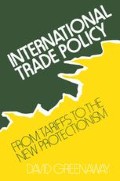Abstract
Almost all of Chapter 1 was concerned with identifying underlying forces of supply and demand which could stimulate exchange. Exchange is, as we emphasised at the outset, a two-way process, and implicit in all we have said so far has been the presumption that exchange is mutually beneficial. After all, if it is not mutually beneficial, it suggests that one of the parties to the transaction ends up worse off after the exchange than before. Although there may be special circumstances under which this may occur, as a general rule it seems highly implausible. Our task now, therefore, is to make the gains from specialisation and exchange more explicit. Not only is this necessary to round off our review of the determinants of exchange, but it is also clearly a prerequisite to any assessment of the net benefits or costs associated with reducing the opportunities for exchange, and resisting the specialisation process.
Preview
Unable to display preview. Download preview PDF.
Author information
Authors and Affiliations
Copyright information
© 1983 David Greenaway
About this chapter
Cite this chapter
Greenaway, D. (1983). Welfare Implications of Specialisation and Exchange. In: International Trade Policy. Palgrave, London. https://doi.org/10.1007/978-1-349-17024-1_3
Download citation
DOI: https://doi.org/10.1007/978-1-349-17024-1_3
Publisher Name: Palgrave, London
Print ISBN: 978-0-333-31253-7
Online ISBN: 978-1-349-17024-1
eBook Packages: Palgrave Business & Management CollectionBusiness and Management (R0)

